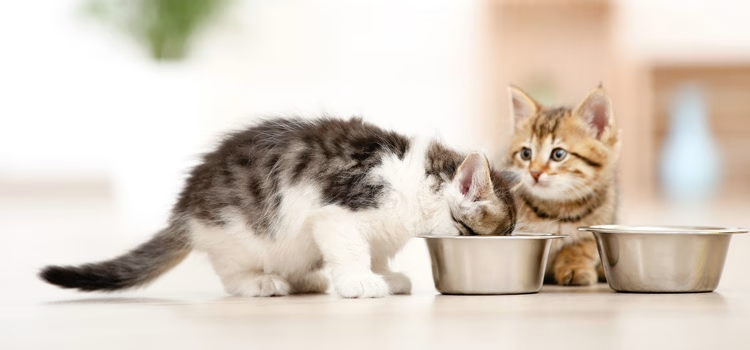Raising a kitten is an exciting journey, but it comes with the responsibility of providing proper care, especially when it comes to their nutrition. Kittens require specific nutrients for their rapid growth, strong immune systems, and overall health. Here’s an expanded guide on how to feeding kittens and keep them thriving.
1. Understanding Your Kitten’s Nutritional Needs
Kittens are in a critical developmental stage, requiring food that supports their growth. Key nutrients include:
- Protein: Essential for muscle and tissue development.
- Fat: A concentrated energy source that also supports a shiny coat.
- Calcium and Phosphorus: Critical for strong bones and teeth.
- Taurine: A vital amino acid for heart and eye health.
- Vitamins and Minerals: Support a strong immune system and overall well-being.
2. Choosing the Right Kitten Food
When selecting food, ensure it’s specifically formulated for kittens. Adult cat food doesn’t provide the necessary nutrients. Look for options labeled as “complete and balanced” by trusted pet food organizations, such as AAFCO.
- Wet Food Benefits: High moisture content, easier to chew, and flavorful.
- Dry Food Benefits: Convenient, cost-effective, and helps with dental health.
- Combination Feeding: A mix of wet and dry food offers the best of both worlds.
3. Feeding Kittens Schedule by Age
Kittens’ feeding needs evolve quickly, and their schedule should reflect their developmental stage.
- 0-4 Weeks: Rely on their mother’s milk or kitten formula if orphaned. Feed every 2-3 hours.
- 4-8 Weeks: Start transitioning to solid food. Introduce a gruel made from wet food mixed with formula or water.
- 2-6 Months: Offer three to four meals daily, as they grow rapidly during this phase.
- 6-12 Months: Reduce to two or three meals daily as growth slows.
4. Portion Control and Caloric Needs
Follow feeding guidelines on the food package, but adjust based on your kitten’s size, activity level, and breed. Consult your vet for tailored advice. Overfeeding can lead to obesity, while underfeeding may stunt growth.
5. Transitioning to Adult Food
Kittens can begin transitioning to adult food around 12 months of age. Gradually mix their kitten food with adult food over 7-10 days to avoid digestive issues.
6. Hydration is Crucial
Kittens need to stay hydrated for healthy kidney function and overall health. Wet food provides some moisture, but always keep fresh water available. Use a shallow dish to make it easier for your kitten to drink.

7. Foods to Avoid
Certain foods can be toxic or harmful to kittens, including:
- Chocolate, Caffeine, and Alcohol: Toxic to cats, even in small amounts.
- Onions, Garlic, and Chives: Can damage red blood cells, leading to anemia.
- Grapes and Raisins: May cause kidney failure.
- Dairy Products: Many cats are lactose intolerant.
- Raw Meat, Fish, and Eggs: Risk of bacteria like Salmonella or E. coli.
8. Supplements: Are They Necessary?
If you’re feeding high-quality commercial kitten food, supplements aren’t typically needed. However, homemade diets often require supplementation to ensure balanced nutrition. Always consult a veterinarian before adding supplements.
9. Behavioral Tips for Feeding Kittens
- Establish a routine by feeding kittens at the same times daily.
- Use shallow bowls for easier access.
- Create a quiet feeding space to minimize stress.
- Avoid free feeding to prevent overeating.
10. Dealing with Picky Eaters
If your kitten refuses to eat:
- Warm their food slightly to enhance the aroma.
- Offer different flavors or textures to see what they prefer.
- Check for dental issues or other health concerns that might cause discomfort.
11. Signs of a Healthy Appetite
A healthy kitten should eat regularly, maintain an active demeanor, and have consistent weight gain. Signs of feeding issues include lethargy, loss of appetite, vomiting, or diarrhea. If these occur, contact your vet promptly.
Feeding your kitten properly sets the foundation for their health and happiness. By understanding their unique needs, offering the right food, and maintaining a consistent routine, you’re giving your furry friend the best start in life.
Key Takeaways:
- Choose kitten-specific food that meets nutritional requirements.
- Feed frequently during their early months and adjust as they grow.
- Ensure they stay hydrated and avoid harmful foods.
- Monitor their appetite, weight, and behavior for signs of health issues.
Your care and attention to your kitten’s diet will ensure they grow into a healthy and vibrant adult cat. Happy feeding!












